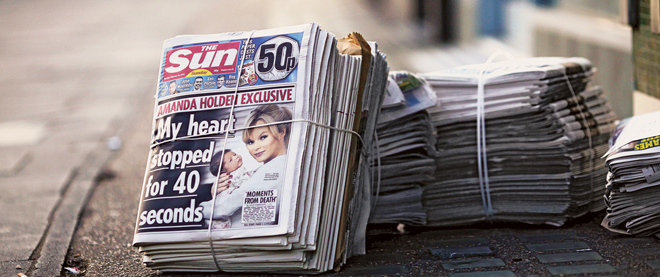Murdoch seeks sunnier days with Sun on Sunday launch
Serious new allegations dog the media mogul, who wants to move on
Tal Cohen/Rex Features/CP
Share

Call it Rupert Murdoch’s 81st birthday present to himself. This past weekend, the embattled media mogul ignored the scandals swirling around him and did something characteristically brazen: he launched a new tabloid—the Sun on Sunday—and sat back to count his profits. On the evening of launch day, Murdoch tweeted gleefully that sales had soared past three million (he’d previously said he’d be happy with anything over two million). It was the social networking equivalent of Murdoch affecting a sinister Mr. Burns-style finger tent and murmuring, “Excellent.” But it was also the tycoon’s way of signalling to the world that he is not prepared to go down without a fight.
His British newspaper arm may have been temporarily depleted after he reluctantly shuttered his scandal-plagued Sunday paper, News of the World (NotW), last year after revelations of widespread phone hacking, but it still has some life left in it. Increasingly, however, industry onlookers predict that such grand gestures will fizzle in the long run.
Given the deepening seriousness of corruption allegations against his empire, Murdoch is beginning to look like a defiant captain rearranging deck chairs on the Titanic. Just hours after the launch of the new Sun, the Leveson inquiry—set up to investigate the role of the press and media in the hacking scandal—reconvened. In what was widely regarded as the most damning day of testimony for Murdoch’s News Corp. so far, there were revelations of a further 200 civil claims from alleged victims of phone hacking and what one police official described as “a culture of illegal payments” at the Sun.
Deputy Assistant Commissioner Sue Akers of the Metropolitan Police told the inquiry of “a network of public officials,” mostly police, who were put on retainers approved by high-ranking Sun journalists, in exchange for information, mostly salacious gossip. These allegations of a systemic culture of corruption fly in face of the long-standing News Corp. party line that corruption was confined to a “single rogue reporter” (later revised to a small group of low-ranking journalists) and increases speculation that criminal charges may be inevitable for high-profile former Murdoch editors and executives like Rebekah Brooks or Andy Coulson.
“The cases we are investigating are not ones involving the odd drink or meal,” Akers stated. “Instead, these are cases in which arrests have been made involving the delivery of regular, frequent and sometimes significant sums of money to small numbers of public officials by journalists.”
Akers’s testimony, which stems from Operation Elveden, the police investigation into bribery, stands in contradiction to the claim Sun employees were being detained in a “witch hunt” simply for having picked up the occasional lunch or drinks tab.
So far, 16 journalists have been arrested. Crucially, some of Elveden’s information came from News Corp.’s management standards committee. If the testimony is proven correct, and the Sun and NotW indeed violated the U.S. Foreign Corrupt Practices Act, under which it’s illegal to bribe foreign officials, the results could be devastating for Murdoch’s New York-based corporation. Whether News Corp.’s board of directors will allow Murdoch to retain his British holdings in the face of such controversy remains to be seen. What’s more clear is the question of who is running the show. And for all his bluster and bravado, it isn’t Rupert Murdoch.
Still, the Sun on Sunday is a welcome addition to Britain’s stagnant newspaper market. Unveiled just nine days after its announced inception, in the wake of the latest round of arrests, the tabloid is exactly what it sounds like: a seventh-day edition of the country’s bestselling red top, a paper of topless totty, celebrity scoops and news stories with headlines like, “How do you solve a problem like Korea?” While it lacks the investigative sizzle of its sister paper, it also refrains from outright sleaze. Most crucially of all, perhaps, it’s a cost-effective replacement for Murdoch’s dearly departed NotW. While the announcement of a newcomer was greeted warmly on all fronts (the BBC bowed to Murdoch’s boldness and even the Guardian grudgingly commended his “sheer speed and audacity”), Murdoch’s reasons for launching the new title are probably every bit as cynical as his reputation would suggest.
While it came suddenly, the launch itself was no surprise. There’s been talk of the Sun rising on Sunday ever since News Corp. consigned NotW to the rubbish heap. It’s rumoured Murdoch has been fantasizing about a way to consolidate the two papers for decades and the phone-hacking scandal offered him the perfect opportunity to do so.
There’s little question that Murdoch himself is wholly committed to remaining a dominant force in British media—but whether his masters will allow him this privilege is another matter entirely. As the plot thickens at the Leveson inquiry, things are no longer looking so “excellent” for the real life Mr. Burns.